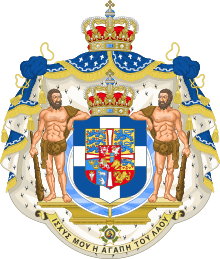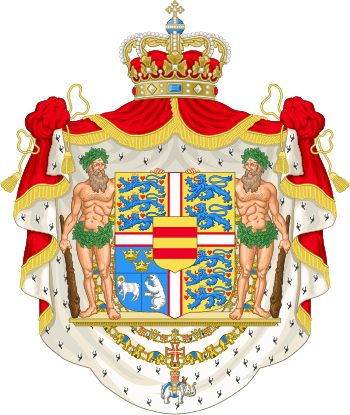Princess Olga of Greece and Denmark
Princess Olga of Greece and Denmark (Greek: Πριγκίπισσα Όλγα της Ελλάδας και Δανίας, Serbian Cyrillic: Кнегиња Олга Карађорђевић; 11 June 1903 – 16 October 1997) was a granddaughter of King George I of Greece and wife of Prince Paul, Regent of the Kingdom of Yugoslavia.
| Princess Olga | |
|---|---|
| Princess Paul of Yugoslavia | |
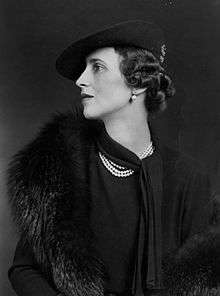 Princess Olga in 1939 | |
| Born | 11 June 1903 Tatoi Palace, Tatoi, Kingdom of Greece |
| Died | 16 October 1997 (aged 94) Paris, France |
| Burial | |
| Spouse | |
| Issue | Prince Alexander Prince Nikola Princess Elizabeth |
| House | Glücksburg-Greece |
| Father | Prince Nicholas of Greece and Denmark |
| Mother | Grand Duchess Elena Vladimirovna of Russia |
Early life
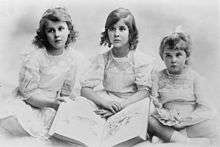
Princess Olga was born in Athens, Greece, on 11 June 1903. Her father was Prince Nicholas of Greece and Denmark, the third son of George I of Greece. Her mother was Grand Duchess Elena Vladimirovna of Russia, a granddaughter of Tsar Alexander II of Russia.
The family of Prince Nicholas was forced into exile when Olga was eleven, following the overthrow of the Greek monarchy, and later moved to Paris, whereas Olga stayed throughout Europe with her extended family, many of whom were far from rich.
Marriage and children
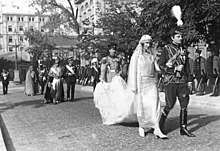
Brought up without wealth, Princess Olga was engaged to Prince Frederick of Denmark in 1922.[1][2] However, the marriage did not take place and she married Prince Paul of Yugoslavia in Belgrade on 22 October 1923.
Prince Paul and Princess Olga had issue:
- Prince Alexander of Yugoslavia (13 August 1924 – 12 May 2016) married Princess Maria Pia of Savoy, daughter of Umberto II of Italy, on 12 February 1955 in Estoril Portugal. They had issue. After their divorce in 1967 he married Princess Barbara of Liechtenstein on 2 November 1973. They also had issue.
- Prince Nicholas of Yugoslavia (29 June 1928 – 12 April 1954)
- Princess Elizabeth of Yugoslavia (born 7 April 1936) married firstly Howard Oxenberg on 21 January 1961, divorced in 1966, two daughters; later married Neil Balfour on 23 September 1969 and they divorced in November 1978. Third time she married Peruvian Prime Minister Manuel Ulloa Elías on 28 February 1987.
Consort of Regent and Second World War
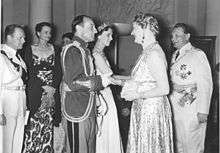
On 9 October 1934, after the assassination of King Alexander I of Yugoslavia, Prince Paul was appointed regent of Yugoslavia until his cousin, Crown Prince Peter, attained his majority in September 1941.[3]
During the Second World War, on 25 March 1941, on behalf of the government led by Cvetković, Prince Paul signed the Tripartite Pact, which took Yugoslavia into the Axis with Germany and Italy, although without any commitment to fight and with guarantees of freedom of action. Two days later, leaders of the Yugoslav air force launched a sudden coup d'état against the government and Regent, declaring King Peter to be of age.[4] Paul, Olga, and their three children were arrested and given as prisoners to the British, who deported them to Greece, where they were guests of King George II, and then on to Egypt. Meanwhile, the change of government in Yugoslavia led Hitler to bomb Belgrade and then to invade the country in April 1941. From house arrest in Cairo, Paul and his family were moved to Kenya, where they arrived on 28 April 1941. There they were guests of Lord Erroll at Osserian, but remained under surveillance.
In August 1942, the accidental death of Prince George, Duke of Kent, left his widow, Princess Marina of Greece and Denmark, inconsolable, and the British government was persuaded to allow Olga to join her sister in England. Once there, she pleaded her husband's case unsuccessfully. Returning to Kenya in January 1943, she found Paul severely depressed. In June the British allowed the family to settle in South Africa, where several members of the Greek royal family were. In South Africa they were no longer treated as prisoners, but they were not formally released until June 1946, a year after the end of the war, and they were not allowed to return to Europe until 1948.
Later life
In 1948, Paul, Olga, and their three children were finally able to travel to Europe. Yugoslavia having fallen to the communists in 1945, they could not go home, and settled first in Switzerland and then in Paris, with frequent visits to London and Florence, where Paul owned a house, the Villa di Pratolino. In Tuscany, Olga was again able to see something of her cousin and friend Helen of Romania, and in Britain was always made welcome by Marina, Duchess of Kent, and the rest of the British royal family.
In 1954, Olga's son Nicholas was killed in a road accident, and then in 1957 her mother died in Athens.
Widowed in 1976, Olga took to living in Britain. Her sister Marina having died in 1968, she stayed at Kensington Palace with Princess Alice, Duchess of Gloucester, and then later at Clarence House, in the household of HM the Queen Mother. She gained the reputation of being a demanding guest.[5]
With old age, Olga's health suffered, but she continued to attend great occasions, such as the marriages of Alexander, Crown Prince of Yugoslavia in 1972, Prince Michael of Kent in 1978, and Charles, Prince of Wales and Lady Diana Spencer in 1981. In 1972 she stood with Prince Alexander at the altar, as his mother and grandmother were not well enough to attend.[6]
Final years and death
Suffering at the end of her life from Alzheimer's disease, Olga spent several years in a hospital at Meudon, in the suburbs of Paris. In 1993, her daughter Princess Elizabeth set out to make a film-documentary about her with the help of a Serbian journalist. However, by then Olga was suffering from dementia, and her daughter's plan created a scandal. Her son Prince Alexander brought an action in the French courts against his sister, claiming $107,000 in damages and interest.[7]
Princess Olga eventually died in Paris on 16 October 1997 and was buried beside her husband and her son Nicholas at the Bois-de-Vaux Cemetery, Lausanne, Switzerland.[8]
On 28 September 2012, after the rehabilitation of Prince Paul by a new Serbian government, the remains of Olga, her husband, and their son Nicholas were exhumed[9] and taken to Belgrade, for a ceremony in St Michael's Cathedral. Present were their surviving children and grandchildren, Crown Prince Alexander and his wife, the President of Serbia Tomislav Nikolić, and members of the government. The remains were then entombed in the Karađorđević family mausoleum of Oplenac.
Title, style and honours
Title and style
- '11 June 1903 – 22 October 1923: Her Royal Highness Princess Olga of Greece and Denmark
- 22 October 1923 – 16 October 1997: Her Royal Highness Princess Paul of Yugoslavia
Honours
National dynastic honours
.svg.png)
.svg.png)
.svg.png)
.svg.png)
Foreign honours
.svg.png)
Ancestry
| Ancestors of Princess Olga of Greece and Denmark | |||||||||||||||||||||||||||||||||||||||||||||||||||||||||||||||||||||||||||||||||||||||||||||||||||||||||||||||||||||||||||||||||||||||||||||||||||||||||||||||||||||||||||||||||||||||||||||||||||||||||||||||||||||||||||||||||||||||||||||||||||||||||||||||||||||||||||||||||||||||||
|---|---|---|---|---|---|---|---|---|---|---|---|---|---|---|---|---|---|---|---|---|---|---|---|---|---|---|---|---|---|---|---|---|---|---|---|---|---|---|---|---|---|---|---|---|---|---|---|---|---|---|---|---|---|---|---|---|---|---|---|---|---|---|---|---|---|---|---|---|---|---|---|---|---|---|---|---|---|---|---|---|---|---|---|---|---|---|---|---|---|---|---|---|---|---|---|---|---|---|---|---|---|---|---|---|---|---|---|---|---|---|---|---|---|---|---|---|---|---|---|---|---|---|---|---|---|---|---|---|---|---|---|---|---|---|---|---|---|---|---|---|---|---|---|---|---|---|---|---|---|---|---|---|---|---|---|---|---|---|---|---|---|---|---|---|---|---|---|---|---|---|---|---|---|---|---|---|---|---|---|---|---|---|---|---|---|---|---|---|---|---|---|---|---|---|---|---|---|---|---|---|---|---|---|---|---|---|---|---|---|---|---|---|---|---|---|---|---|---|---|---|---|---|---|---|---|---|---|---|---|---|---|---|---|---|---|---|---|---|---|---|---|---|---|---|---|---|---|---|---|---|---|---|---|---|---|---|---|---|---|---|---|---|---|---|---|---|---|---|---|---|---|---|---|---|---|---|---|---|---|---|---|
| |||||||||||||||||||||||||||||||||||||||||||||||||||||||||||||||||||||||||||||||||||||||||||||||||||||||||||||||||||||||||||||||||||||||||||||||||||||||||||||||||||||||||||||||||||||||||||||||||||||||||||||||||||||||||||||||||||||||||||||||||||||||||||||||||||||||||||||||||||||||||
References
- "DANISH HEIR ENGAGED.; Crown Prince Will Wed Princess Olga of Greece". The New York Times. Associated Press. 6 March 1922. Retrieved 13 May 2017.
- "CONSTANTINE'S NIECE NOT TO WED PRINCE; Engagement of Princess Olga and Heir to the Danish Throne Is Annuled". The New York Times. Associated Press. 28 September 1922. Retrieved 13 May 2017.
- Neil R. Balfour, Obituary: Princess Paul of Yugoslavia in The Independent dated 3 November 1997
- Mateos Sainz de Medrano (2004), p. 260
- Ricardo Mateos Sainz de Medrano, La Familia de la Reina Sofía : La Dinastía griega, la Casa de Hannover y los reales primos de Europa, Madrid, La Esfera de los Libros (2004, ISBN 978-8-4973-4195-0, OCLC 55595158), pp. 261–262
- Mateos Sainz de Medrano (2004), pp. 262, 412, 456
- Mateos Sainz de Medrano (2004), pp. 262–263
- Mateos Sainz de Medrano (2004), p. 262
- Marie Parvex, «Elisabeth de Yougoslavie exhume ses parents enterrés à Lausanne», in Le Temps dated 28 septembre 2012
- "Photo". s-media-cache-ak0.pinimg.com.
- "Photo". media.gettyimages.com.
- "Photo". royalchronicles.gr.
- "Photo". s-media-cache-ak0.pinimg.com.
- "Photo". s-media-cache-ak0.pinimg.com.
- "Photo". 2.bp.blogspot.com.
External links
![]()
